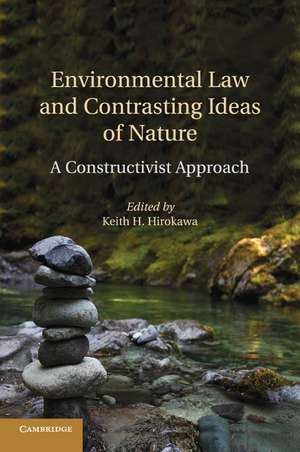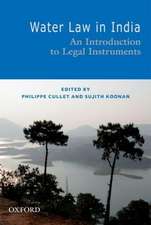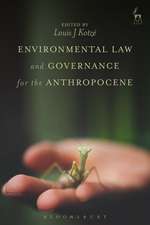Environmental Law and Contrasting Ideas of Nature: A Constructivist Approach
Editat de Keith H. Hirokawaen Limba Engleză Paperback – 6 ian 2016
| Toate formatele și edițiile | Preț | Express |
|---|---|---|
| Paperback (1) | 320.55 lei 6-8 săpt. | |
| Cambridge University Press – 6 ian 2016 | 320.55 lei 6-8 săpt. | |
| Hardback (1) | 783.49 lei 6-8 săpt. | |
| Cambridge University Press – 16 iul 2014 | 783.49 lei 6-8 săpt. |
Preț: 320.55 lei
Nou
Puncte Express: 481
Preț estimativ în valută:
61.33€ • 64.05$ • 50.65£
61.33€ • 64.05$ • 50.65£
Carte tipărită la comandă
Livrare economică 15-29 aprilie
Preluare comenzi: 021 569.72.76
Specificații
ISBN-13: 9781316507575
ISBN-10: 1316507572
Pagini: 362
Ilustrații: 1 map
Dimensiuni: 230 x 150 x 20 mm
Greutate: 0.49 kg
Editura: Cambridge University Press
Colecția Cambridge University Press
Locul publicării:New York, United States
ISBN-10: 1316507572
Pagini: 362
Ilustrații: 1 map
Dimensiuni: 230 x 150 x 20 mm
Greutate: 0.49 kg
Editura: Cambridge University Press
Colecția Cambridge University Press
Locul publicării:New York, United States
Cuprins
1. Nature in a constructed world: grounding the constructivist method Rik Scarce and Keith H. Hirokawa; 2. An unnatural divide: how law obscures individual environmental harms Katrina Fischer Kuh; 3. Defining nature as a common pool resource Jonathan D. Rosenbloom; 4. Property constructs and nature's challenge to property perpetuity Jessica Owley; 5. Perceiving change and knowing nature: shifting baselines and nature's resiliency Robin Kundis Craig; 6. Animals and law in the American city Irus Braverman; 7. Boundaries of nature and the American city Stephen R. Miller; 8. Constructing nature the radical way: extreme environmentalism and law Rik Scarce; 9. Wilderness imperatives and untrammeled nature Sandra B. Zellmer; 10. Native American values and laws of exclusion Catherine Iorns-Magallanes; 11. Challenging what appears 'natural': the environmental justice movement's impact on the environmental agenda Shannon M. Roesler; 12. The transformation of water Dan A. Tarlock; 13. Framing watersheds Craig Anthony Arnold; 14. The last, last frontier Michael Burger.
Recenzii
'Would nature exist without property law? … this is the kind of inquiry Keith Hirokawa and his collaborators … ask us to explore as a way of gaining deeper appreciation of law's construction of nature as a human concept. Every chapter in this volume reminds us that nature is not the world without humans, it is a part of the world humans construct through law and other social institutions. … This collection of essays offers a bounty of fresh, innovative, and insightful expositions on that immensely important question. It will change the way you think law should think about nature.' J. B. Ruhl, David Daniels Allen Distinguished Chair of Law, Vanderbilt University Law School
'By exploring how we construct and change nature by our laws, the contributors to this book demonstrate the importance of new policy debates and the need for changing our constructs, especially in a climate altered world. To have a new way of looking at the world, we have to understand how we got where we are. This book does this beautifully.' Victor B. Flatt, Director, Center for Law, Environment, Adaptation, and Resource, University of North Carolina
'By exploring how we construct and change nature by our laws, the contributors to this book demonstrate the importance of new policy debates and the need for changing our constructs, especially in a climate altered world. To have a new way of looking at the world, we have to understand how we got where we are. This book does this beautifully.' Victor B. Flatt, Director, Center for Law, Environment, Adaptation, and Resource, University of North Carolina
Descriere
This book examines how nature is constructed through law, building on the constructivist concept that 'nature' is a self-perpetuating, self-reinforcing social creation.














